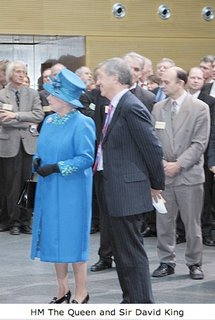
Queen Elizabeth II opened a major British-German conference: "Climate Change: Meeting the Challenge Together" at the British Embassy Berlin on November 3, 2004, signaling her concern about climate change. Good things happened at that conference:
- The UK's Chief Scientific Adviser Sir David King said: "In less than 200 years human activity has increased the atmospheric concentration of greenhouse gases by some 50% relative to pre-industrial levels. At about 378 parts per million (ppm), today's atmospheric carbon dioxide level is higher than at any time in the past 800,000 years."
- He also said: "There is no previous human experience of the Earth's atmosphere at current levels of greenhouse gases to assist us to predict the outcomes. It is likely, though, that the natural oscillating pattern of ice ages and warm periods is now being rapidly disturbed."
 Gerhard Schröder said: "Combating climate change is one of the key challenges of the 21st century. In order to effectively counter its consequences, the emission of greenhouse gases around the world must be substantially reduced."
Gerhard Schröder said: "Combating climate change is one of the key challenges of the 21st century. In order to effectively counter its consequences, the emission of greenhouse gases around the world must be substantially reduced."- He also said that:"Under the EU burden-sharing mechanism, Germany has pledged to reduce its greenhouse gas emissions by 21% from 1990 levels by the year 2012. We are making good progress. In 2002 we had already reduced emissions by some 19%."
Spin has played a big part in this squashing of debate. It's hard to present clearly when you're always on the defensive, when the attacks are personal and virulent, when popular writers and purchased pseudo-scientists are given more credibility than billion-dollar governmental think tanks. NASA's Dr. James Hansen is a courageous man to have stood his ground for all these years to this type of attack.
There is momentum to open this dialogue. May 24th Al Gore's move premiers; the press is paying more attention; the world community is demanding that we pay attention; the Internet is proliferating with information about our weather crisis; the major weekly and monthly magazines are running feature stories on the subject; and Bush has lost so much credibility and has had to retrench so radically that Americans are beginning to pay attention once again.
More to follow shortly . . .
* I'm researching him presently.